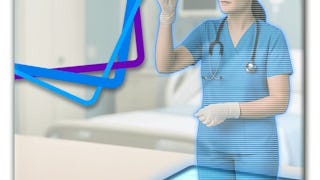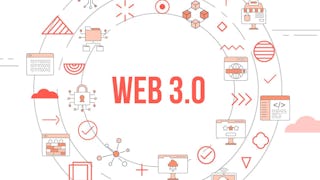- Browse
- Soft Skills
Results for "soft skills"
 Status: Free TrialFree Trial
Status: Free TrialFree TrialSkills you'll gain: Microsoft Excel, Pivot Tables And Charts, Excel Formulas, Data Presentation, Data Storytelling, Data Visualization Software, Microsoft Copilot, Statistical Analysis, Data Analysis, Statistical Methods, Data Integration, Data-Driven Decision-Making
4.3·Rating, 4.3 out of 5 stars33 reviewsBeginner · Course · 1 - 3 Months
 Status: Free TrialFree TrialS
Status: Free TrialFree TrialSSalesforce
Skills you'll gain: Customer Relationship Management, Salesforce, Sales Prospecting, Sales Development, Sales Enablement, Business Software, Sales Strategy, Sales Pipelines, LinkedIn, Productivity Software, Social Media, Video Production
4.3·Rating, 4.3 out of 5 stars36 reviewsBeginner · Course · 1 - 3 Months
 Status: Free TrialFree Trial
Status: Free TrialFree TrialSkills you'll gain: Blood Collection, Phlebotomy, Medication Administration, Healthcare Ethics, Automated External Defibrillator, Medical Laboratory, Cardiopulmonary Resuscitation (CPR), First Aid, Emergency Medicine, Laboratory Testing, Airway Management, Diagnostic Tests, Health Care, Emergency Response, Dignity in Care, Patient Communication, Patient-centered Care, Critical Thinking and Problem Solving, Decision Making, Critical Thinking
4.8·Rating, 4.8 out of 5 stars6 reviewsBeginner · Course · 1 - 4 Weeks
 Status: PreviewPreviewU
Status: PreviewPreviewUUniversiteit Leiden
Skills you'll gain: Sustainable Development, Sustainable Systems, Environment, Pollution Prevention, Climate Change Mitigation, Environmental Policy, Environmental Science, Systems Thinking, Climate Change Adaptation, Biology, Community Organizing
4.9·Rating, 4.9 out of 5 stars52 reviewsBeginner · Course · 1 - 4 Weeks
 Status: Free TrialFree Trial
Status: Free TrialFree TrialSkills you'll gain: PyTorch (Machine Learning Library), Model Evaluation, Deep Learning, Machine Learning, Artificial Neural Networks, Artificial Intelligence, Python Programming, Data Preprocessing, Regression Analysis, Software Installation, System Configuration, Development Environment, Performance Tuning
4.4·Rating, 4.4 out of 5 stars43 reviewsIntermediate · Course · 1 - 3 Months
 Status: PreviewPreview
Status: PreviewPreviewSkills you'll gain: Blockchain, Frontend Integration, Transaction Processing, Event-Driven Programming, Front-End Web Development, JavaScript Frameworks, Event Monitoring, Full-Stack Web Development, Development Environment, Web Development, Web Applications, Program Development, React.js, Emerging Technologies, Application Development, Javascript, FinTech
4.8·Rating, 4.8 out of 5 stars77 reviewsIntermediate · Course · 1 - 4 Weeks
 Status: Free TrialFree Trial
Status: Free TrialFree TrialSkills you'll gain: Blockchain, Development Environment, Software Development Tools, Application Deployment, Transaction Processing, Application Design, Front-End Web Development, Cloud Development, Event-Driven Programming, Development Testing, Javascript
5·Rating, 5 out of 5 stars49 reviewsBeginner · Course · 1 - 4 Weeks
 Status: Free TrialFree TrialC
Status: Free TrialFree TrialCCVS Health
Skills you'll gain: Transaction Processing, Retail Sales, Retail Store Operations, Cash Register Operation, Greeting Customers, Customer Inquiries, Customer Service, Teamwork, Data Entry, Customer Relationship Building, Point of Sale, E-Commerce, Order Management Systems, Professionalism, Payment Processing and Collection, Communication, Time Management, Social Media
4.7·Rating, 4.7 out of 5 stars34 reviewsBeginner · Course · 1 - 3 Months
 Status: Free TrialFree TrialA
Status: Free TrialFree TrialAArizona State University
Skills you'll gain: Influencing, Strategic Thinking, Negotiation, Recognizing Others, Active Listening, Strategic Communication, Game Theory, Empathy, Critical Thinking, Decision Making, Motivational Skills, Analysis
4.4·Rating, 4.4 out of 5 stars12 reviewsMixed · Course · 1 - 3 Months
 Status: Free TrialFree TrialL
Status: Free TrialFree TrialLLearnQuest
Skills you'll gain: Angular, Web Components, Cascading Style Sheets (CSS), JavaScript Frameworks, Application Frameworks, UI Components, Front-End Web Development, TypeScript, Web Applications, Hypertext Markup Language (HTML), Web Development, Development Environment
4.3·Rating, 4.3 out of 5 stars46 reviewsBeginner · Course · 1 - 4 Weeks
 C
CCoursera
Skills you'll gain: Goal Setting, Workflow Management, Organizational Skills, Project Management Software, Project Management, Work Breakdown Structure, Resource Allocation
4.6·Rating, 4.6 out of 5 stars25 reviewsBeginner · Guided Project · Less Than 2 Hours
 Status: PreviewPreviewS
Status: PreviewPreviewSStarweaver
Skills you'll gain: Employee Performance Management, Performance Management, Constructive Feedback, Performance Review, People Management, Goal Setting, Team Management, Performance Metric, Expectation Management, Coaching, Employee Engagement, Collaboration, Accountability, Communication Strategies
4.8·Rating, 4.8 out of 5 stars52 reviewsBeginner · Course · 1 - 4 Weeks
Searches related to soft skills
In summary, here are 10 of our most popular soft skills courses
- Advanced Data Analysis & Visualization with Copilot in Excel: Microsoft
- Boosting Productivity through the Tech Stack: Salesforce
- Every Second Counts: Advanced and Emergency Clinical Skills : Immersify
- The Great Sustainability Transition: Global challenges, Local actions: Universiteit Leiden
- Foundations and Core Concepts of PyTorch: Packt
- Empowering with web3.js: Web3 Applications: EDUCBA
- Introduction to Ethereum Blockchain: EDUCBA
- Retail Customer Service: CVS Health
- Perspective-Taking: Arizona State University
- Angular 17 Overview & Basics: LearnQuest










